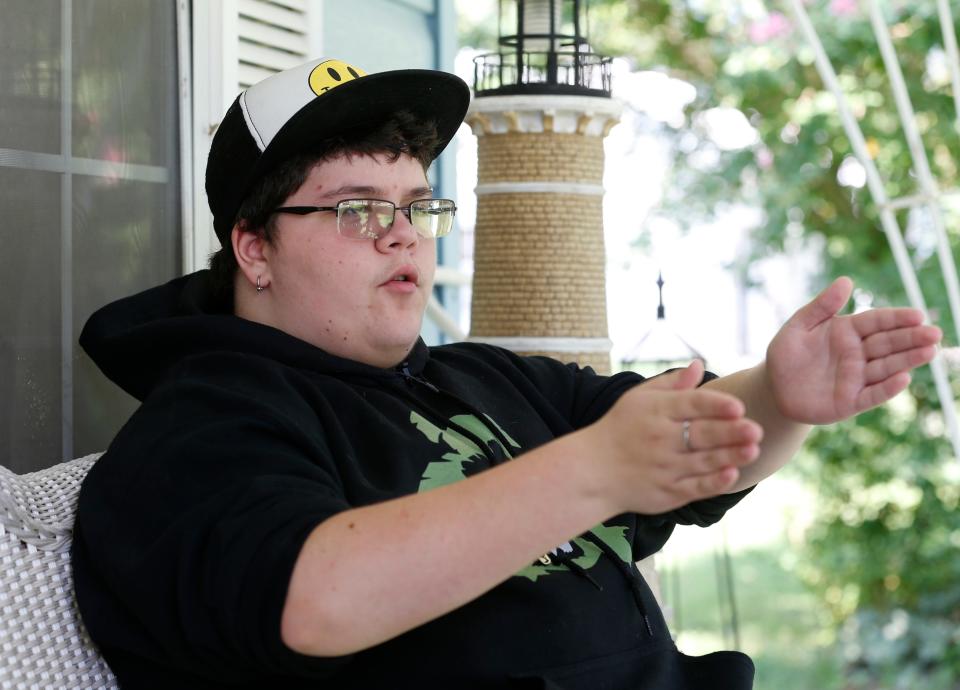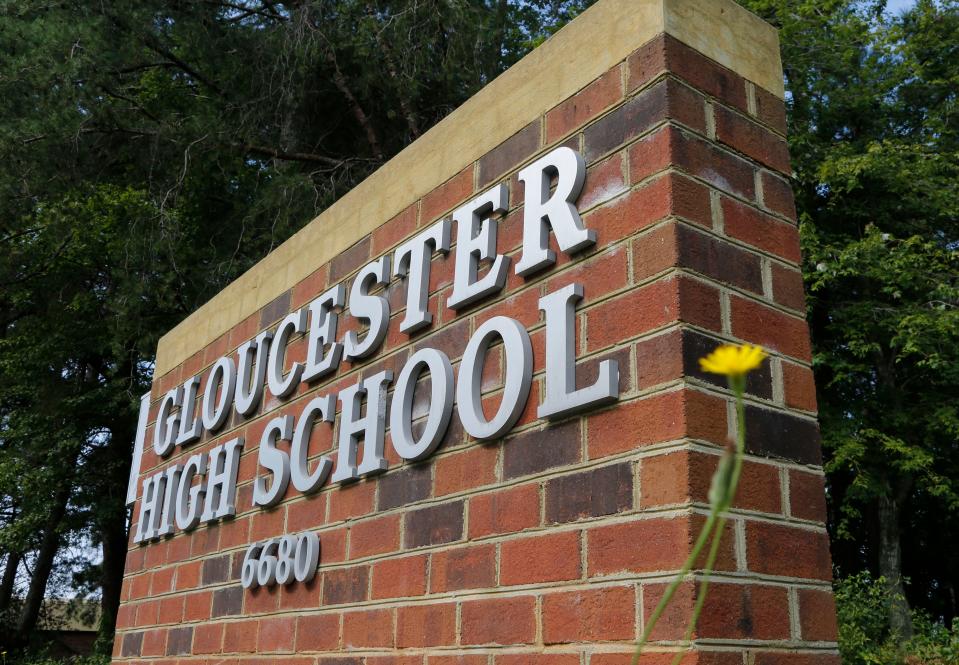Bathroom battle begun by trans teen is back at Supreme Court, years after he finished high school
WASHINGTON – Gavin Grimm, the transgender student at the center of a yearslong legal struggle over school bathrooms, is now in his 20s. He graduated from the Virginia high school that blocked him from using the boys’ bathroom four years ago.
While Grimm has moved on from the school – and a casual observer could be forgiven for thinking his dispute was resolved – his case is back at the Supreme Court, along with the underlying question of whether public schools may ban transgender students from using a restroom that reflects their gender identity.

Grimm’s lawsuit drew a barrage of headlines five years ago when the Supreme Court initially agreed to hear it, and it returns at a time when conservative states are enacting laws to restrict transgender athletes, bar discussion of gender identity in classrooms without parental consent, and make it harder to change the sex assigned on a birth certificate.
The Supreme Court is set to discuss on June 24 whether to take up the case again.
"A lot of people in the country are in a different place than they were five years ago," said Josh Block, a senior staff attorney with the American Civil Liberties Union, which has represented Grimm in the legal battle for years. "I hope that if the justices do take the case they'll have seen that for the past five years, the sky hasn't fallen."
Bostock: How a Supreme Court decision is reshaping the battle over LGBTQ rights
Fact check: Posts criticizing Biden order on gender discrimination lack context
If the court takes the case, a decision could have sweeping implications, potentially extending a landmark employment discrimination decision from last year. In Bostock v. Clayton County, the court held that workplace discrimination on the basis of sex included sexual orientation and gender identity – a big victory for gay rights advocates.
One of the questions posed by the Grimm suit is whether to expand that same reasoning to education, housing and other areas where "sex" discrimination is prohibited. One of the first targets of that effort is Title IX, the nearly 50-year-old federal law that prohibits discrimination at any school that receives federal funding.
But Associate Justice Neil Gorsuch, who wrote the majority opinion in Bostock, said that the decision did "not purport to address bathrooms, locker rooms, or anything else of the kind." Gorsuch was joined in the majority by Chief Justice John Roberts and the court’s four liberal justices at the time. Three conservatives dissented.
"If the logic of this were extended, it could have repercussions way beyond the facts of the case,” said Steven Fitschen, president of the National Legal Foundation, a Christian public-interest legal group that helped to write a brief arguing the court should use the case to reconsider its decision in Bostock. "One is discrimination in employment. The other deals with Title IX ... so there’s a different legislative history."
‘Unsafe, anxious, and disrespected’
Grimm was a rising sophomore when he changed his first name to Gavin and began using male pronouns. Officials at Gloucester High School were supportive, but blowback from parents prompted the school board to bar Grimm from the boys’ bathroom, directing him instead to unisex bathrooms – three of which were built in response to the controversy.
Grimm said the mandate made him feel "stigmatized and isolated." The unisex bathrooms were unavailable when he attended football games and afterschool activities. Grimm would often "hold it," leading to urinary tract infections. He sued in 2015, claiming the board’s policy violated Title IX and the 14th Amendment's Equal Protection Clause.
"By the time I started eleventh grade, the stress was unbearable. I was in an environment every single day, five days a week, where I felt unsafe, anxious, and disrespected," Grimm, who went on to attend college in California, said in a 2019 statement to the court. "I told my mom that I was having suicidal thoughts."

Landscape: From bathrooms to ball fields, transgender rights advance after court ruling
More: Supreme Court lets stand school's bathroom policy for transgender students
Grimm’s case was initially dismissed in district court, but he won at the Richmond-based U.S. Court of Appeals for the 4th Circuit. The court rested its decision in part on guidance from the Department of Education under President Barack Obama that advised schools that Title IX prohibited discrimination on the basis of gender identity.
The school district appealed the decision to the Supreme Court, which agreed to answer the question of whether the administration’s guidance was sound.
But then President Donald Trump's administration rescinded the guidance in 2017, ending the appeal. The Supreme Court wiped out the lower court’s ruling. In a separate case in 2019, the justices declined to hear a challenge to a Pennsylvania school district's policy that permitted transgender students to use bathrooms reflecting their gender identity.
Four years after the high court dropped the case, President Joe Biden signed an order on his first day in office signaling the administration would reinstate the former policy. The school district was back at the Supreme Court less than a month later.
On Wednesday, the Department of Education took that a step further by issuing guidance asserting that transgender and gay students are protected by Title IX.

A lawyer for the Gloucester County school board did not respond to a request for comment, but the district told the court this year that the Bostock case isn’t relevant because its policy is about biological sex, not gender identity. Title IX does allow schools to create separate bathrooms, locker rooms and other facilities for girls and boys.
"Under the board’s policy, 'sex' remains binary and grounded in biology, with no discrimination based on noncompliance with sex-based norms," the school said.
Unease despite victories
LGBTQ advocates have won major legal battles in recent years, including Bostock as well as the 2015 Supreme Court case that legalized same-sex marriage, Obergefell v. Hodges. And appeals courts in Chicago, Atlanta, as well as the Richmond, Virginia, court in Grimm's case, have all held that schools violate federal law when they prohibit transgender boys from using the same restrooms as cisgender boys.
But there is still palpable unease among gay rights lawyers for two reasons: There has been a significant uptick in state laws aimed at transgender people and the Supreme Court is more conservative than it was when it decided Obergefell and Bostock. Conservatives now enjoy a 6-3 advantage on the court for the first time in decades.
Nearly two dozen laws limiting LGBTQ rights have been approved in at least nine states this year, surpassing the count in 2015 – which previously had the most such laws, according to the Human Rights Campaign, an LGBTQ advocacy group. Several seem designed to prompt lawsuits that could eventually wind up at the Supreme Court.
Tennessee Gov. Bill Lee, a Republican, signed a law in March requiring transgender students to compete in school sports according to their sex assigned at birth. Arkansas became the first state to ban gender-affirming treatments for transgender minors. Montana Gov. Greg Gianforte, a Republican, signed a law barring people who have not undergone gender-affirming surgery from changing the sex assigned on their birth certificate.
"Those who care about equality can’t help but be nervous when this court takes up LGBTQ cases, particularly those which involve transgender individuals," said Kristen Prata Browde, co-chair of the National Trans Bar Association.
This article originally appeared on USA TODAY: Gavin Grimm's trans rights bathroom battle returns to Supreme Court

 Yahoo Movies
Yahoo Movies 
